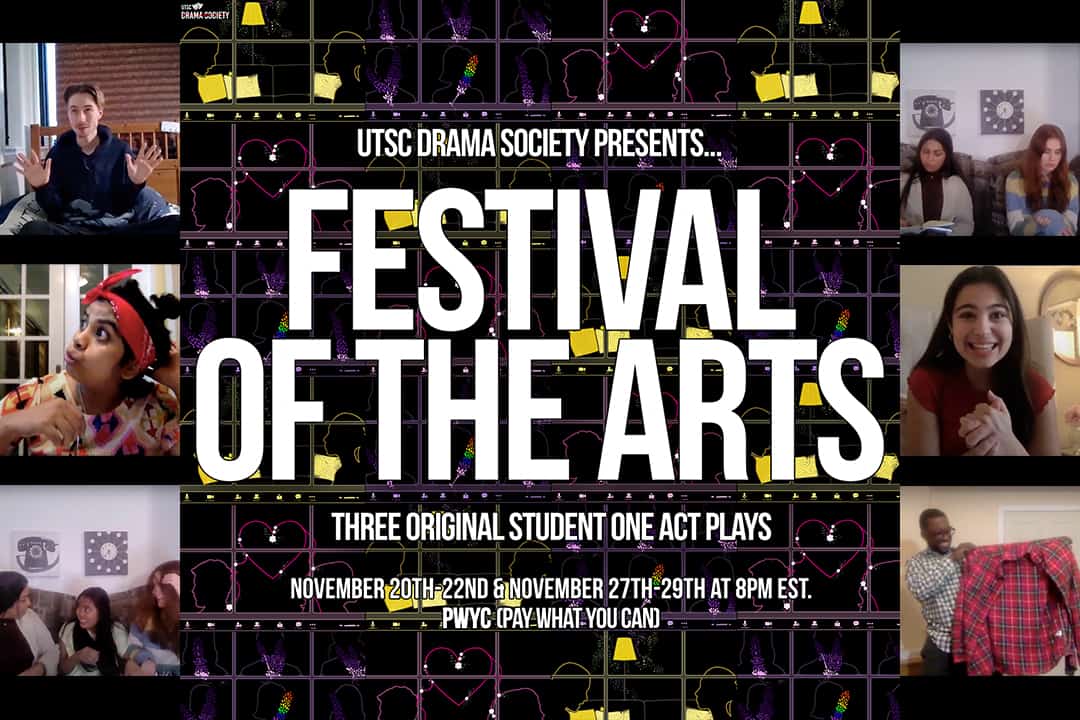I had the pleasure of attending the virtual Festival of the Arts, presented by the UTSC Drama Society from November 27–30, and it did not disappoint. The festival included three original student one-act plays in addition to other events. It has been a while since I attended a show, and this was definitely my first virtual festival, but the students’ talent was undeniable.
Overall, my favourite part of the festival was how well they integrated Zoom video calls and video recordings into the performance. In the first play, they aligned the calls to make it appear as though the characters were in the same room. In the second, the video calls were used as the only form of communication between characters. In the last play, the characters kept the camera in one location and filmed the entire scene on the couch. All three used virtual formats perfectly without having it take away from the play.
According to Artistic Director Valeria Venturo Esaine, the overarching theme of “Collective Consciousness” was chosen in an effort to “create stories that could express the various ways we are responding to what is happening around us.”
The first play, How to Care for Lavender in Winter, is a coming-out story. Coming out is already difficult, but coming out to your family during a pandemic is on a whole other level. It seems impossible when you are forced into isolation within the confines of a childhood home that now feels suffocating.
The acting done by all of the characters was exceptional. I especially like the scene where Dorothy (Lagan Maheshwari), the main character, comes out at the dinner table. The demeanor changed from being quiet, to laughing nervously, to questioning why we cry while laughing, before changing to a more serious tone.
The change in emotions is very interesting, and the way Dorothy comes out feels very sudden. It felt as though she is exhausted with hiding and just wants to let it out, so she did. As soon as she says it, the reality sinks in, and the silence before she repeats herself really solidifies the scene for me.
The second play is called First Love and delves behind the scenes of a very toxic relationship. Some of us have grand ideas from movies of how romance is meant to be — the perfect fairy tale. This is certainly not the reality for most, if not all, relationships.
This piece explores the love story of Angelica (Samantha Maratta), a woman who imagines romance to be perfect but learns about the harsh reality. It takes a look at what the relationship truly is. The question of whether a true love connection can only be found in fiction is also explored in this piece.
The play accurately depicts the fall from rom-com to reality. As the boyfriend, Dylan (Nicholas Mazzoli), gets more clingy and refuses to accept boundaries, you watch Angelica’s mental health decline on screen.
Halfway through the play, Angelica despairs over not knowing how to properly make Dylan feel special. This sentiment is so relatable. In a relationship where it seems as though you have to put the other person above yourself, it becomes a toxic slippery slope. Sometimes, you only realize how far down you are when you are facing up the mountain from the bottom.
I love how they ended the play with Angelica calling her friend Maya (Desire Figueroa) for help. It is a very supportive friendship and shows there is room for healing.
The third play, Sunday Grace, is a story about finding the balance between familial obligations and being true to yourself and your desires. Grace (Alexandra Romanescu) tells her mother that she wants to move out and is met with a lot of hostility.
Grace goes on to have a one-sided conversation and begs her mom (Maha Bellazzi) to say something. You can really feel the plea for help or to be heard, and you can hear the trembling in her voice as she attempts to even get the words out. Then, you see her enter a panic attack, evidenced through the difficulty breathing, while her mom continues to turn away from her.
For Esaine, a major takeaway from organizing the festival virtually was seeing “change as an opportunity instead of a limitation.” The UTSC Drama Society did just that with this festival, which contained must-watch shows that covered a range of relevant issues for our pandemic-ridden times.


